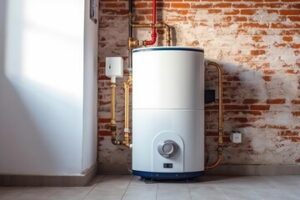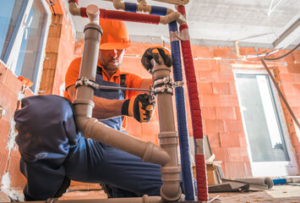Hot Water Heater Repair Morris County is easy to take for granted until it stops working. But a quick fix may be within reach.

A leaking water heater or one that’s not producing enough hot water typically requires the help of a plumber. But some water heater problems can be addressed by the homeowner.
A mechanical thermostat regulates heat by expanding and contracting a strip of metal inside it. When the room gets too hot, this strip bends enough to open the electric circuit, which switches on the heating. When the strip cools down, it snaps back into its original shape and closes the circuit, shutting off the heating. By adjusting the temperature dial on the thermostat, you can control how long it takes for the strip to expand and contract.
If you’re getting no hot water, check to see if the heater’s circuit breaker has tripped. If it has, reset it by turning off the power at your service panel, opening the access door to the top of the unit and pushing the red high-temperature cutoff reset button. Then turn the power back on and give the tank an hour to reheat.
Then look at the thermostat to make sure it’s set to the correct temperature. It’s also a good idea to check the air screens on the bottom of the tank for sediment buildup that could interfere with the heating process.
If the tank is leaking, it’s time to replace it. This could be caused by rust or corrosion on the interior of the tank or by a leak in one of the valves, which could be worn down from normal use.
While it’s possible to replace a thermostat yourself, this is generally a job for a plumber. However, replacement parts are fairly inexpensive and do-it-yourselfers should be able to follow detailed instructions. Even so, do-it-yourself repairs always come with a risk of costly errors. So, unless you’re experienced with electric water heaters, a professional should be the way to go. Having trouble with discolored or smelly water is another sign that it’s time to get the tank replaced. This could be caused by a corroded tank or the development of bacteria in the tank. In most cases, this issue is easily resolved with a simple flush. This should be done on a regular basis to keep your tank lasting longer. It’s also a good time to consider upgrading to a newer, more energy-efficient model.
Pressure Relief Valve
A pressure relief valve, also known as a T&P valve, is a safety feature that helps prevent over-pressurization inside the tank. Over time, metal parts within your water heater can build up and create excess pressure. The pressure-relief valve is designed to open and relieve this pressure when needed. It has a spring-loaded “poppet” that includes an elastomeric or thermoplastic seal that seats against the valve seat. Under normal pressure, the valve stays closed. When upstream pressure increases to a certain point, it overcomes the force of the spring and opens the valve. This allows water and steam to be released through a long discharge tube, which can vent out of the top or bottom of your tank. Once the system overpressure has fallen to a point below its set pressure, the spring force re-seats the valve, closing it.
A broken or leaking water heater T&P valve can lead to dangerous situations, such as hot water spilling over the side of the tank. It can also result in a fire. To test if your T&P valve is working correctly, you can position a bucket under the plastic relief drain pipe and open it. If water flows into the bucket, it’s working as it should.
The temperature and pressure of your water heater should be tested regularly, preferably every year. The pressure and temperature of your tank can increase over the years due to sediment build-up or other factors. These pressures and temperatures must be within safe limits to ensure the safety of your family and pets.
In addition to checking the temperature and pressure of your tank, you should also check for a damaged dip tube that supplies cold water to your unit. If you notice rust or corrosion, it’s time to replace the tube. It is recommended that you hire a professional plumber to do this job. If you do this yourself, make sure you fully follow the safety manual that accompanies your unit.
Anode Rod
Anode rods, sometimes called sacrificial anodes, are long metal rods suspended inside your water heater tank. Their primary function is to protect the steel or iron lining of your tank from corrosion by attracting the corrosive elements in the water, through a process called electrolysis. If the anode rod becomes too deteriorated, it should be replaced. You can do this yourself, or you can hire a professional.
An anode rod is made of aluminum, magnesium, zinc or a combination of these materials. The choice of anode material depends on the type and quality of your water, where it is sourced and whether or not you have hard or soft water. Aluminum is a good option for hard water, while magnesium and zinc rods work well in soft water conditions.
A deteriorated anode rod can affect the operation of your hot water heater, but it is relatively inexpensive and easy to replace. Physical inspection is one way to determine if the rod needs replacement. If the rod is heavily corroded or covered in calcium deposits, it is time to replace it.
Another sign that the anode rod needs replacing is smelly water. Sulfur, a common mineral found in some types of water, can react with the anode rod and create unpleasant, rotten egg-like odors. If you notice these odors, you can try turning off your water for a few minutes, draining the tank, and then running the hot water again. This should get rid of the odors.
If you are concerned about the rotten egg smell or discolored water, or if you suspect a leak around the anode rod, contact us to schedule an inspection and repair of your water heater. We’ll check the anode rod and recommend any necessary repairs or replacements to help extend the life of your water heater. We’ll always take your safety into consideration when conducting any repairs, and we provide fast, affordable service. Getting an expert technician to perform your Hot Water Heater Repair can save you time, money and frustration in the long run. Let us show you why we’re a cut above the rest!
Tank
The tank is what houses your hot water. It should be inspected regularly for any signs of problems. If the tank starts to leak it should be replaced as soon as possible, as this can lead to serious water damage. If you notice your hot water is smelling funny or appearing discolored this could mean there is rust in the tank or sediment build up inside the pipes. The rust and sediment can cause a build-up that blocks the heater’s ability to heat water properly. A professional should flush the tank to remove this debris and help restore your hot water heater to proper working order.
If your water heater seems to be making strange noises, such as rumbling or popping, it is likely that there is sediment build-up in the bottom of the tank. This is an easy fix for your plumber, who will simply drain the water from the tank and flush it. This should be done at least once per year to prevent sediment from building up and causing the unit to malfunction.
Another common problem with water heater tanks is when they stop heating altogether. If your electric or gas water heater is suddenly stopping heating you might have a bad thermostat or heating element. You can check for a faulty thermostat by using an electrical continuity tester, which you can find at most hardware stores for about $10. If your water heater has two heating elements you might have one that has burned out.
If you have a gas water heater with a pilot light, you might need to have the thermocouple or the gas control valve replaced. These are important parts that keep your water safe from dangerous carbon monoxide. If your water heater has a gas leak, it is important to have it fixed immediately. A leaking gas water heater can leak carbon monoxide into the home, which is extremely dangerous and may even be fatal. If you think your water heater is leaking it’s a good idea to have it inspected by a plumber right away, so they can fix the problem before it gets worse.

